Rosemary makes your food last longer thanks to its powerful natural compounds that work in two key ways. First, its antioxidants (like rosmarinic acid and carnosol) prevent fats from going rancid and help maintain food's fresh color and taste. Second, rosemary's essential oils fight harmful bacteria like E. coli and Salmonella that cause food spoilage. You'll find it working hard in everything from meat products to cooking oils, matching or even outperforming synthetic preservatives. This versatile herb doesn't just extend shelf life – it brings a host of health benefits that make it nature's perfect preservation solution.
Nature's Powerful Antioxidant

Three powerful compounds in rosemary – rosmarinic acid, carnosic acid, and carnosol – make it one of nature's most effective antioxidants. When you use rosemary in food preservation, these compounds work together to boost your body's natural defense system against harmful free radicals. Incorporating rosemary into food products has become increasingly popular as manufacturers move toward natural preservatives. They specifically increase the activity of superoxide dismutase, an enzyme that helps neutralize these damaging molecules.
You'll find that rosemary's antioxidant properties are measurably superior to many other herbs, as shown by scientific parameters like EC50, DPPH, and ABTS tests. What makes rosemary particularly effective is its ability to both scavenge free radicals and chelate metals, which prevents lipid peroxidation – a major cause of food spoilage.
If you're concerned about chronic inflammation or oxidative stress, rosemary's antioxidant properties can help protect your cells. Its compounds work synergistically with other antioxidants, particularly Vitamin E, enhancing their protective effects.
This natural powerhouse doesn't just preserve food; it actively fights against the cellular damage that can lead to various health issues, making it a valuable addition to both your pantry and your diet.
Fighting Food-Spoiling Bacteria
When it comes to fighting harmful bacteria in food, rosemary's essential oil stands out as a powerful natural weapon. You'll find it's particularly effective against common foodborne pathogens like E. coli, Salmonella, and Staphylococcus aureus, making your food safer and longer-lasting.
Recent studies have shown rosemary extracts can effectively inhibit 11 of 14 microbial species even at low concentrations.
What makes rosemary so effective is its unique way of attacking bacteria. The oil's components, including eucalyptol and α-pinene, work together to break down bacterial cell structures and alter their membrane permeability. You can think of it as creating holes in the bacteria's armor, making them more vulnerable to destruction.
You'll be interested to know that rosemary doesn't just work alone – it can enhance the effectiveness of other preservatives and even traditional antibiotics. When you use rosemary in food preservation, it prevents bacteria from forming protective biofilms and can help maintain your food's freshness without artificial additives.
Whether you're storing meat, poultry, fruits, or vegetables, rosemary's natural preservative powers can help extend shelf life while preventing unwanted odors and flavors.
It's becoming an increasingly popular alternative to synthetic preservatives in the food industry.
Preserving Different Food Products
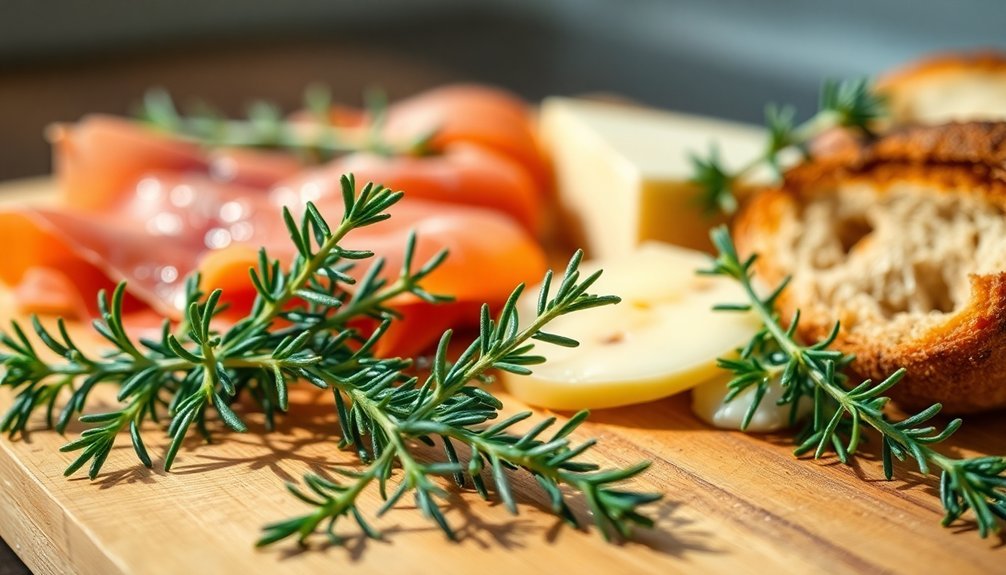
Now that you understand how rosemary fights bacteria, let's explore its practical applications across different food categories.
In meat and poultry, you'll find rosemary essential oils and extracts reducing Salmonella counts while preventing lipid oxidation in burgers and liver patties. When combined with citrus extracts, it can greatly reduce listeria growth in ground meat. Studies show essential oils from rosemary can effectively reduce total bacterial counts during refrigerated storage.
You'll also see rosemary's preservative power in fats and oils, where it extends fry life and prevents rancidity. It's particularly effective in stabilizing nuts and seeds rich in PUFAs, while also maintaining freshness in margarine and beverages with carotenoid-based colors.
In prepared foods, rosemary works wonders when blended with other extracts. You can find it preserving mayonnaise and salad dressings, where it matches EDTA's protective effects when combined with spinach extract. It's equally effective in sauces and various prepared foods, maintaining their fresh taste and quality.
For fresh produce, you'll find rosemary extracts working alongside modified atmosphere packaging to extend shelf life. Its FDA-approved GRAS status means you can safely rely on it across multiple food categories, from bakery items to beverages.
Beyond Synthetic Food Preservatives
You'll find that rosemary's natural antioxidant compounds, including carnosic acid and rosmarinic acid, perform as effectively as synthetic preservatives like BHA and BHT in preventing food deterioration.
When combined with other natural ingredients like citrus and green tea extracts, rosemary's preservation power increases markedly, often surpassing the effectiveness of traditional chemical preservatives.
This natural alternative not only meets consumer demands for clean labels but also provides scientifically proven preservation capabilities that match or exceed synthetic options in many food applications.
Natural vs. Synthetic Performance
Although synthetic preservatives have dominated the food industry for decades, rosemary extract's performance has proven superior in multiple areas of food preservation. When compared to synthetic antioxidants like BHA, BHT, and TBHQ, rosemary extract shows better results in reducing lipid oxidation and maintaining color stability, particularly in meat and poultry products.
You'll find rosemary's effectiveness extends beyond its antioxidant properties. It actively fights against 11 out of 14 microbial species, even at low concentrations, and it's particularly effective at inhibiting dangerous bacteria like listeria and salmonella.
When you combine rosemary with other natural extracts, such as citrus, you'll achieve even more impressive results – including a greater than 1.5 log reduction in listeria growth.
What's especially significant is rosemary's versatility in different applications. You can use it in oils, powders, or encapsulated forms, and it works synergistically with other natural extracts like acerola, green tea, and pomegranate.
This natural preservative not only matches but often surpasses synthetic alternatives in maintaining product freshness, stability, and shelf life, all while meeting growing consumer demand for natural ingredients.
Better Than Chemical Alternatives
Recent research has revealed that rosemary's preservative powers extend far beyond matching synthetic alternatives – they often surpass them. The extract's multi-functional properties make it a superior choice, as it simultaneously fights harmful bacteria, prevents oxidation, and maintains food quality, something most synthetic preservatives can't achieve alone.
You'll find rosemary extract particularly effective against 11 out of 14 common microbial species, even at low concentrations. It actively inhibits dangerous pathogens like listeria and salmonella while preventing rancidity in various food products. When you combine rosemary with other natural extracts, you'll get even better antimicrobial performance through synergistic effects.
What makes rosemary stand out is its ability to preserve both safety and sensory qualities. Unlike many chemical preservatives, it maintains the fresh taste, color, and odor of foods while extending their shelf life.
You'll notice this especially in meat products, where rosemary prevents color degradation and keeps the red meat looking fresh. It also stops the formation of hexanal, which causes off-flavors, making it a thorough solution for food preservation.
Combining With Other Natural Preservatives
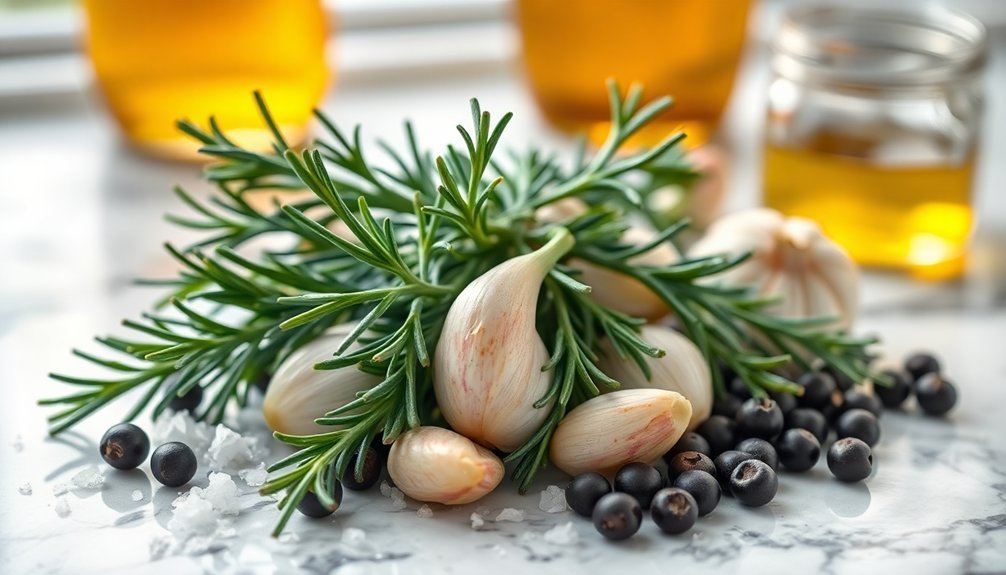
When you combine rosemary with citrus extracts, you'll create a powerful preservation duo that reduces bacterial growth by more than 1.5 log in fresh ground meat.
You'll find enhanced antimicrobial protection when rosemary works alongside other natural preservatives, especially against dangerous pathogens like listeria and salmonella.
The synergy between rosemary and tea extracts provides exceptional antioxidant properties, helping you maintain food freshness and extend shelf life naturally.
Citrus-Rosemary Power Duo
Through the powerful combination of rosemary and citrus extracts, food manufacturers have discovered a natural preservation powerhouse that extends shelf life while maintaining product quality.
When you combine rosemary's carnosic acid with citrus antioxidants, you'll get enhanced protection against oxidation and microbial growth, particularly in meat and poultry products. This dynamic duo can reduce listeria growth by more than 1.5 log compared to untreated samples.
What's particularly exciting about this combination is that you won't need to use as much of either ingredient to achieve better results. The synergistic effect means:
- Lower usage rates, leading to potential cost savings
- Reduced impact on product flavor
- Greater antimicrobial and antioxidant protection than using either extract alone
You'll find this preservation blend particularly effective in preventing rancidity in snacks, bakery goods, and oils.
It's also excellent for stabilizing nuts and seeds rich in PUFAs. With consumer demand for clean labels growing stronger, it's no surprise that product launches featuring rosemary extract have increased seven-fold between 2008 and 2019.
This natural preservation solution helps reduce food waste while meeting your needs for cleaner ingredients.
Enhanced Antimicrobial Protection
Building upon the success of citrus-rosemary combinations, food manufacturers have expanded their natural preservation toolkit by combining rosemary with an array of other herbs and spices. When you combine rosemary with ingredients like acerola, green tea, and pomegranate, you'll get enhanced antimicrobial effects that work better than using rosemary alone.
These powerful blends can effectively inhibit harmful bacteria like E. coli, Listeria, and Staphylococcus aureus. What's particularly impressive is how rosemary works to overcome bacterial resistance by reducing membrane impermeability, making it harder for harmful microorganisms to survive.
You'll find these combinations particularly effective in preventing Candida albicans from adhering to surfaces and stopping fungal biofilms from forming.
The key to success lies in the concentration and form you choose. For ideal results against foodborne pathogens, you'll want to use around 500 µL.L-1 of rosemary extract. You can find rosemary extracts in various forms, including fine brown powder, liquid, and both oil-soluble and water-dispersible formats.
The carnosic acid content, which can range from 5% to 98%, plays an essential role in determining the extract's effectiveness.
Tea Extract Synergy
The synergy between rosemary and tea extracts has revolutionized natural food preservation. When you combine rosemary with green tea extract, you'll get a powerful antioxidant blend that's more effective than using either ingredient alone. This combination doesn't just protect your food – it actively enhances the preservation process by creating a stronger defense against oxidation and bacterial growth.
What makes this partnership particularly effective is its ability to:
- Extend shelf life while maintaining product freshness and stability
- Prevent rancidity in oils, fats, and foods rich in PUFAs
- Combat multiple types of harmful bacteria, including listeria and salmonella
You'll find this natural preservation duo especially valuable in protecting meat, poultry, and perishable foods. The rosemary-tea extract combination helps prevent unpleasant odors, maintains color stability, and keeps flavors fresh for longer periods.
What's more, this synergistic approach aligns perfectly with today's clean-label trends. As consumers increasingly demand natural alternatives to synthetic preservatives, manufacturers are turning to this powerful combination to meet both preservation needs and market expectations.
Health Benefits While Preserving Food
While preserving food with rosemary, you'll gain significant health benefits from its powerful antioxidants and antimicrobial compounds. As you consume foods preserved with rosemary, you're getting essential nutrients like calcium, potassium, magnesium, and vitamin B6.
The herb's high manganese content supports your metabolic health and helps form blood clots for faster healing.
You'll benefit from rosemary's carnosic acid, which research shows can slow cancer cell growth and reduce tumor risks. The antioxidants, including rosmarinic acid and carnosol, work to protect your cells by increasing superoxide dismutase activity, an enzyme that fights harmful free radicals.
When you eat rosemary-preserved foods, you're also supporting your immune system by reducing exposure to harmful bacteria like listeria and salmonella.
The herb's phytochemicals can improve your eye health, regulate liver function, and lower asthma risks. You'll notice better concentration and digestion, plus support for your gastrointestinal health.
What's particularly impressive is that you'll get these health advantages while your food stays fresh longer, without any compromise to its taste or quality.
Frequently Asked Questions
Does Cooking With Rosemary Provide the Same Preservation Benefits as Extract?
No, when you cook with fresh or dried rosemary, you won't get the same preservation benefits as extracts. The extracts are more concentrated and maintain higher levels of active compounds that fight bacteria and oxidation.
How Long Can Rosemary Extract Extend the Shelf Life of Different Foods?
You'll see rosemary extract extend shelf life considerably: up to 6 days for meat, several months for oils and fats, and weeks for snacks and baked goods, depending on storage conditions and concentrations used.
Can Too Much Rosemary Extract Affect the Taste of Food Products?
Yes, if you use too much rosemary extract, it'll overwhelm your food with a strong herbal taste. You can balance it by adding wine, stock, or other ingredients like onions and garlic.
Is Fresh Rosemary as Effective as Dried Rosemary for Food Preservation?
Fresh rosemary is actually more effective than dried for preservation since it contains higher levels of active compounds and aromatic oils. You'll get better antimicrobial and antioxidant benefits when using fresh over dried rosemary.
What's the Best Way to Store Rosemary Extract to Maintain Its Preservative Properties?
You'll need to store your rosemary extract in an airtight container in a cool, dark place. Don't expose it to moisture or light, and avoid freezing it to maintain its antioxidant and preservative properties.
In Summary
You've learned how rosemary's natural compounds work as powerful preservatives, extending your food's shelf life while adding wonderful flavor. Whether you're using fresh sprigs, dried leaves, or essential oil, rosemary fights bacteria and oxidation effectively. As you explore natural food preservation methods, remember that this versatile herb offers both preservative qualities and health benefits, making it a smart choice for your kitchen and wellness routine.
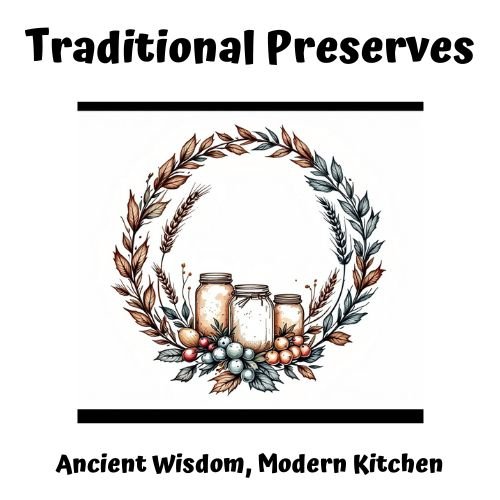


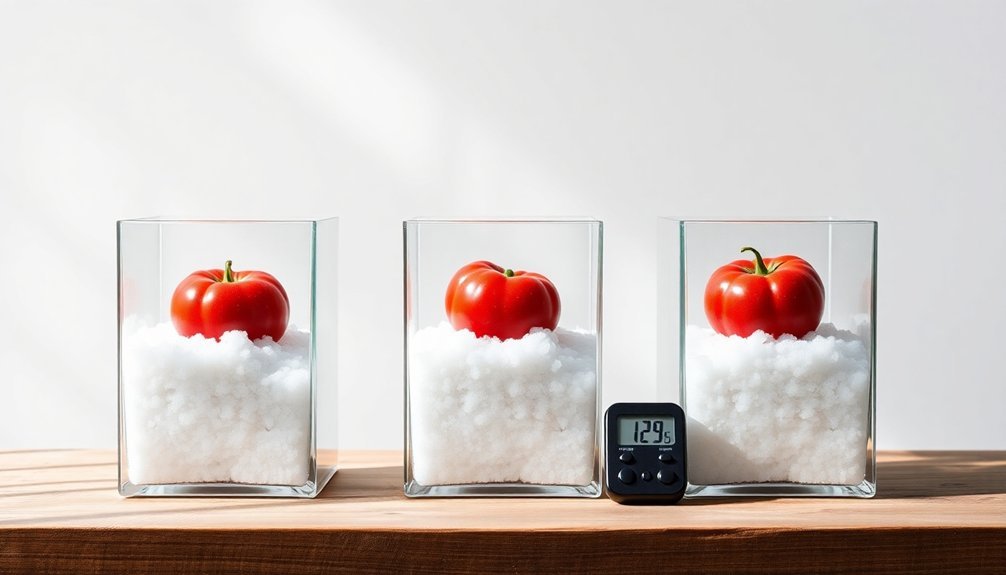
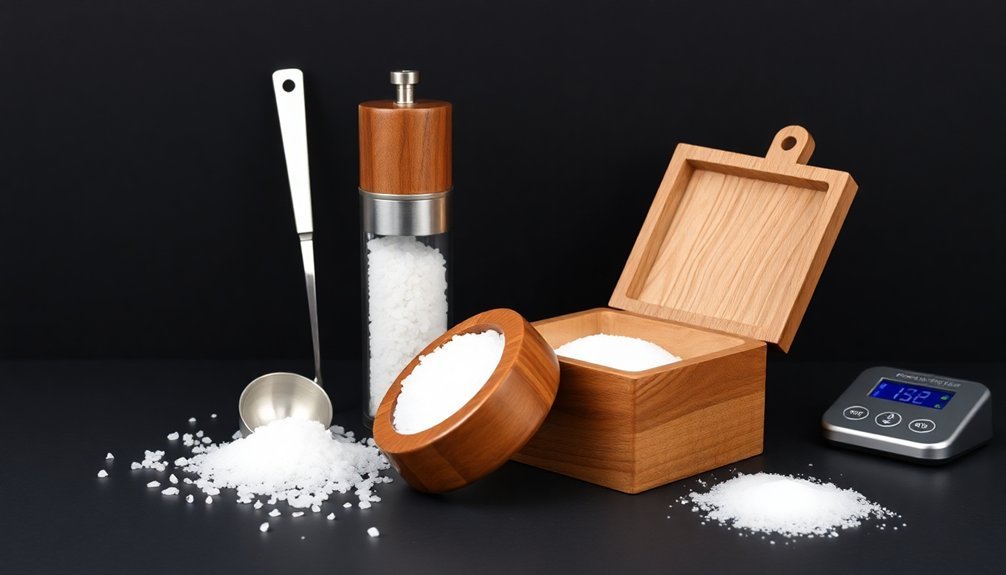
Leave a Reply